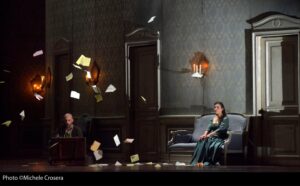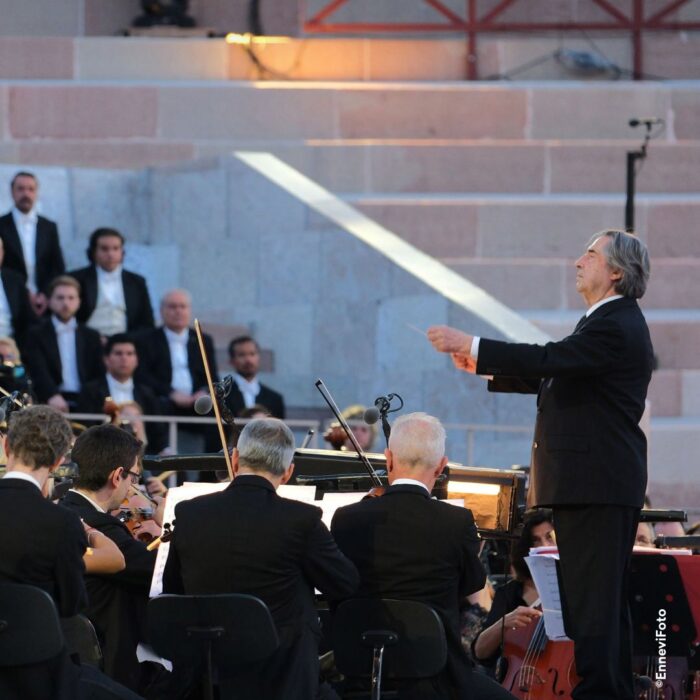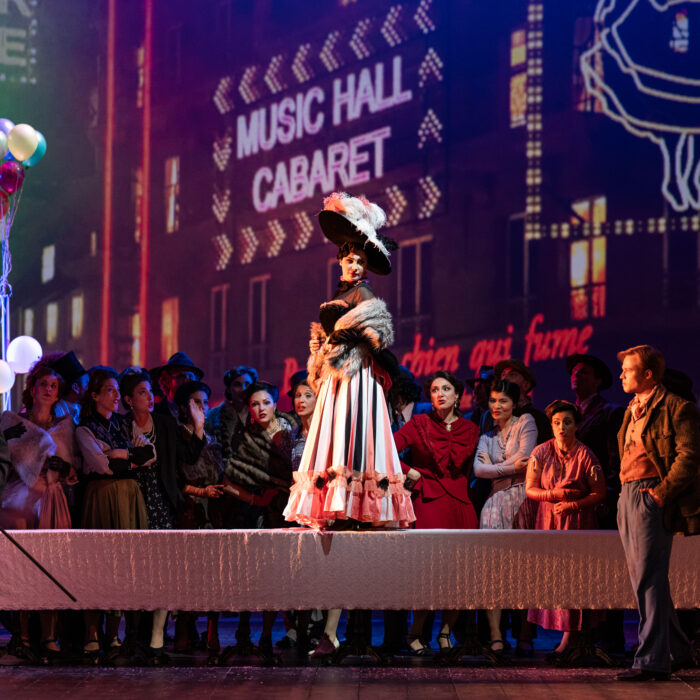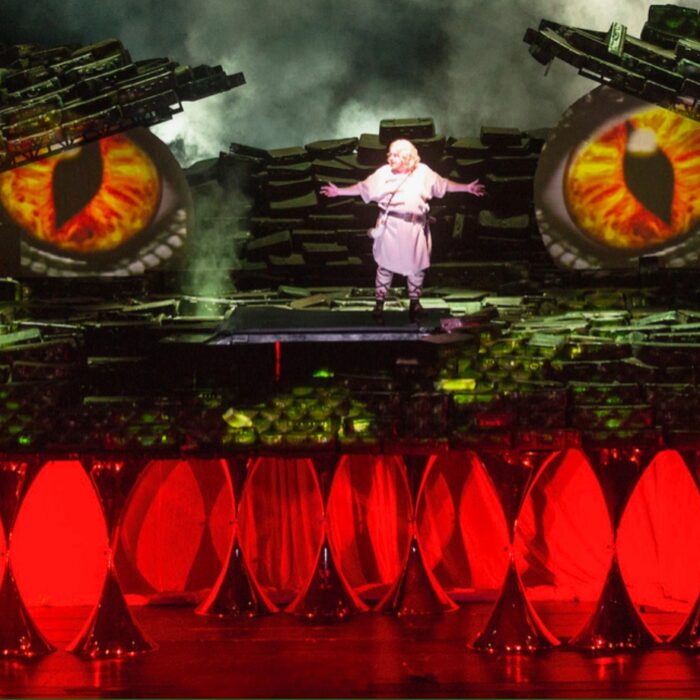
Teatro La Fenice 2024 Review: Don Giovanni
By João Marcos Copertino(Photo credit: Michele Crosera)
Having seen more versions of “Don Giovanni” than there are sands on the beach, I can attest that the greatness of the opera is seldom undermined by a less than optimum staging. However, when the staging is good—or even great—, one feels that there is no better opera than “Don Giovanni.” The revival of Damiano Michieletto’s production of it confronted me with a problem: even though musically, there were good moments, the lack of inspiration in both the stage direction and the lead singer made the experience somewhat exhausting—a word I never thought I would use when talking about Mozart and Da Ponte’s magnum opus.
Revivals are a tricky thing. They are notoriously under rehearsed and usually struggle to live up to their first openings. Directors with guile often change a thing or two during the revival to make the staging new—but it requires much work and cooperation. Here in Venice, the cast seemed to be searching for their chemistry, without ever finding it.
The main problem with Michieletto’s staging was its lack of intellectual and emotional coherence. There were many ideas that might or might not have been aesthetically motivated, but that hardly said anything—leaving the audience to return home feeling empty.
A few things were undeniable mistakes: there was complete erasure of the urban context of “Don Giovanni.” Michieletto’s opera is all indoors, in a spinning maze-palace that looks like the haunted hotel in “The Shining.” The palace, seen only in photographs, looks late eighteenth century: opera goers who fear modern productions will see the images and believe this is a “traditional staging.” But what is the substance? Niente! The more one thinks about it, the worse it gets—how can a house be a place for an opera that deals precisely with the randomness of urban life? How can the darkness of the house be mocked during the ball scene—if much of the appeal of “Don Giovanni” is that it happens in the dark—where no one can be properly seen? Why do the seduction scenes always begin with people in separate rooms, with someone magically entering the other’s room without any explanation? Why should Donna Anna and Donna Elvira be doubles, and Leporello and Giovanni not?
All these questions reveal a staging that seems to have ideas about the opera that could be interesting were they properly developed and reflected on, but, in their unexplored shape, they lead the audience to frustration and disappointment. Worse, few of these unexplored ideas actually lead to a better appreciation of the opera. This is not a request for a strong-thesis-reading of “Don Giovanni”—clearly D.G. can be many things—, but a noting of the simple fact that there is no suggestion of where the beauty or the strength of the drama really resides.
In the end, when Don Giovanni appears alive, looming like an embodied ghost over the cast as if they were waking up from a nightmare, the effect was not so much an inexplicable coup de theatre. It just made no sense at all. Michieletto is a Venetian who has done very good work elsewhere; this opera staging, however, only survives, in my opinion, because its scenarios are eighteenth-century styled.
Another annoying aspect of the staging is its noisiness. This works on two levels: on the one hand, the cast was very sonorous in their scenic movements, especially when crying and laughing. Such an effect has become a rule in efforts to “fuel up” baroque and classical opera. Here, everything sounds histrionic and disingenuous. Donna Anna’s crying in the first act deserves the Thalia prize of Mexican telenovela acting. At the few moments when someone seemed on the verge of reaching a true emotion, someone in the cast had to make a loud sound by stomping on the floor, breaking a glass, or hammering a pipe. Another problem of the noisiness was mechanical. This often irritating trend of opera houses’ saving costs with spinning scenarios—a signature of Peter Gelb’s Met—requires silent machinery, which was far from the case in La Fenice. So, in musically quieter moments, the audience had to endure the sound of chains rolling under the stage. The noise was so conspicuous that I think it deserved to be credited with its own line on the program: I could barely hear the voice and the mandolin in “Deh, viene alla finestra.” The syncopated screams of the lazy susan of a stage were the real soloists…
Walking home, I thought of all the other productions of “Don Giovanni” I have seen. Each production embraced the complexity of the opera, understanding that any shortcomings in the cast could be hidden simply by focusing attention on the most elementary aspects of the work. This rule works from Sellars’s Harlem production to a conservatory production with a bare stage. It is my understanding that opera stagings should be more like essays than statements of a thesis. They contemplate their opera, frame it, circle it, and enable us to admire it with different eyes. For this to be possible, there must be a communication between the stage and the audience that makes visible for us what the producers admire so much about the work. Here, this never happened. What do they like about Giovanni?
Markus Werba, a singer who is otherwise very accomplished, seemed an improper Don Giovanni in many ways. The baryton has a nice voice, good Italian, and is not physically unappealing (my partner thinks he looks like a film actor). But still, his Giovanni is the least seductive man on the stage. On the one hand, his voice resonates less in the hall than anyone else’s in the cast, forcing Werba to sing louder to be heard—and nevertheless he was still less audible than anyone else. As a consequence, missing too, was most of Don Giovanni’s seductive phrasing, along with the capacity to imitate other cast members’ musical lines so essential for constituting his opaque identity. It was not evident whether Werba had a vision of the character as a whole. His might be called a Giovanni without qualities that did not imply a visible intention behind the blankness. His abrasive sexuality was less about seduction than about enforcing submission; this Giovanni was more of a patriarch than a young man. More seductive, and he might have left us pleased if conflicted by his resurrection at the end of the opera; because the production saw fit to emphasize coercion rather than seduction, that resurrection, to the degree that it was coherent at all, seemed calculated to punish us, or the opera, for the fact that malefactors in this world are often rewarded.
Zuzana Marková, on the other hand, was a very interesting Donna Anna. The soprano was evidently in a less-than-comfortable vocal zone—making her voice particularly more squeezed and stretched; nevertheless, she engaged such vocal contrition to her advantage. In spite of a perhaps cold start in the opera’s first scene—with a bit of hamming and too drastic dynamic changes—, most of the performance was extremely nuanced. Her Anna managed to be sorrowful without a drop of hysteria. Her “Crudele!… Non mi dir” facing the dead body of her father made the aria significantly more sympathetic (a good aspect of the staging!). The masked trio was ideal, and “Fuggi crudele Fuggi” was on the spot. Donna Anna used to be the powerhouse of more dramatic voices, but lighter sopranos, with a strong dramatic will, often steal the show—as was the case with Marková.
Another great addition of the night was Alex Esposito as Leporello. The singer who last month made a jaw-dropping representation of the devil in Boito’s “Mefistotele” again proved himself as a great actor with a very scrupulous and shy Leporello. Esposito sported his usually crystal-clear enunciation and generous voice with much uniformity in the registers. He perfectly encapsulated the production’s approach of diminishing Leporello’s identification with Don Giovanni. Hidden behind his glasses, his catalogue aria was almost sad. It was evident that Esposito knew what he was doing with his character; the problem is that the staging did not know what to do with its characters.
Francesca Dotto, once Donna Anna in this production, sang a very interesting Donna Elvira. Her consonants were harsh and severe; her vowels, extremely rounded. Hers was an Elvira whose sufferings made her showcase extreme control over her language—as if she had to over control what was said so as not to say what she does not want to say. Some musical moments were particularly exciting, especially the recitative accompagnato before “Mi tradi quell’alma ingrata.” If it were not for the noisy spinning scenario in the aria—and were the tempi a hair slower—, it would have been a perfect rendition of the aria. There is much to enjoy there, especially in a character who has so much to offer.
I personally think that few roles are as dramatically annoying as Don Ottavio. Do not get me wrong, he has two of the best arias in the tenor repertoire, but isn’t it aggravating how castrated he is, especially compared to Don Giovanni? Even before #metoo many saw in Don Giovanni a representation of what is evil in masculinity; if that is the case, what is left for the sexless Ottavio? This production, perhaps intent on highlighting how evil Don Giovanni is, emphasized his depredations, although it is also arguable that he is in fact thwarted in all his attempts to have sex represented by the opera. That the opera takes seriously the fact that he is evil while also making him the butt of a joke is a complexity that perhaps few productions these days are able to face; this one certainly did not try. Francesco Demuro, not the most natural of actors, managed to give the role a sense of dignity intrinsically connected to the voice. Especially in “Il mio tesoro,” Demuro sang as if bearing in mind that the song’s beauty has the power to moralize the opera. His voice is lyric, but with edges for dramatic emphasis. Perhaps there is some salvation for Don Ottavio!
Lucrezia Drei provided her beautiful voice to Zerlina, singing the role with a welcoming vigor and a charming thick vibrato. William Corrò might have been a bit too demasculinized even for Masetto—although the role is a sad one, his acting and voice conveyed a sense of weakness that may have been too exaggerated.
An acquaintance of mine often sings “Don Giovanni a cenar teco” when he is drunk in the streets after 2am. Thankfully he is a tenor, and his voice does not wake the sleepers in their beds. However, were he Gianluca Buratto, there would not be enough lorazepam to keep Venetians asleep. Acoustically, few voices resonate more than Buratto in a theater of La Fenice’s size. While the bass sang everything in forte, his voice is in noticeably good shape—which made the final scene as menacing as it should be.
Finally, we ought to commend the work of Robert Treviño in the orchestral pit. Having seen the La Fenice orchestra in many capacities, it is noticeable how a great and serious conductor manages to extract the best sonority from them. In Treviño’s hands, the orchestra never covered the singers, and preserved a tuned and extremely Mozartian sonority—something that I would have thought impossible after their performances this season of Verdi and—most importantly—Mozart’s Requiem. Although at a few moments they may have played a bit faster than usual, and although there were some small difficulties with the mandolin pianissimos in the repetition of “Deh viene alla finestra,” these were small issues in an otherwise optimum performance. If the staging was rather a disappointment to me, as a fan and follower of the theatre’s orchestra, it is amazing to see when they exceed themselves.


